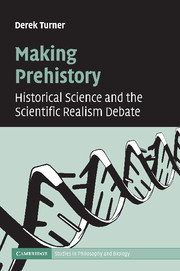Book contents
- Frontmatter
- Contents
- List of figures
- Acknowledgments
- Introduction
- 1 Asymmetries
- 2 The colors of the dinosaurs
- 3 Manipulation matters
- 4 Paleontology's chimeras
- 5 Novel predictions in historical science
- 6 Making prehistory: could the past be socially constructed?
- 7 The natural historical attitude
- 8 Snowball Earth in the balance
- Conclusion
- References
- Index
5 - Novel predictions in historical science
Published online by Cambridge University Press: 22 September 2009
- Frontmatter
- Contents
- List of figures
- Acknowledgments
- Introduction
- 1 Asymmetries
- 2 The colors of the dinosaurs
- 3 Manipulation matters
- 4 Paleontology's chimeras
- 5 Novel predictions in historical science
- 6 Making prehistory: could the past be socially constructed?
- 7 The natural historical attitude
- 8 Snowball Earth in the balance
- Conclusion
- References
- Index
Summary
Scientific realists sometimes respond to the pessimistic induction from the history of science by placing extra weight on predictive novelty. Sure, there are plenty of cases in which scientific theories yielded accurate predictions in their day, and were later shown to be mistaken. But were those predictions novel? Philosophers who favor the pessimistic induction will have a more difficult time producing examples of discredited theories that once enjoyed novel predictive success. What's more, contemporary scientific realists, such as Leplin (1997) and Psillos (1999) typically defend their views with a new and improved version of the traditional abductive argument for realism. According to this new version of the argument, the phenomenon that cries out for realist explanation is not just any old empirical success, but novel predictive success. Do the asymmetry of manipulability and the role asymmetry of background theories have any bearing on this new line of argument for scientific realism?
I believe that they do. The asymmetry of manipulability and the role asymmetry of background theories mean that novel predictive successes are harder to come by in historical than in experimental science.
NOVEL, UNTESTABLE PREDICTIONS
Suppose that some scientific theory T, when conjoined with a set of background assumptions A, predicts an empirical result O. And suppose that O is a novel prediction in the sense spelled out by Jarrett Leplin (1997) in his book-length defense of scientific realism.
- Type
- Chapter
- Information
- Making PrehistoryHistorical Science and the Scientific Realism Debate, pp. 101 - 129Publisher: Cambridge University PressPrint publication year: 2007



